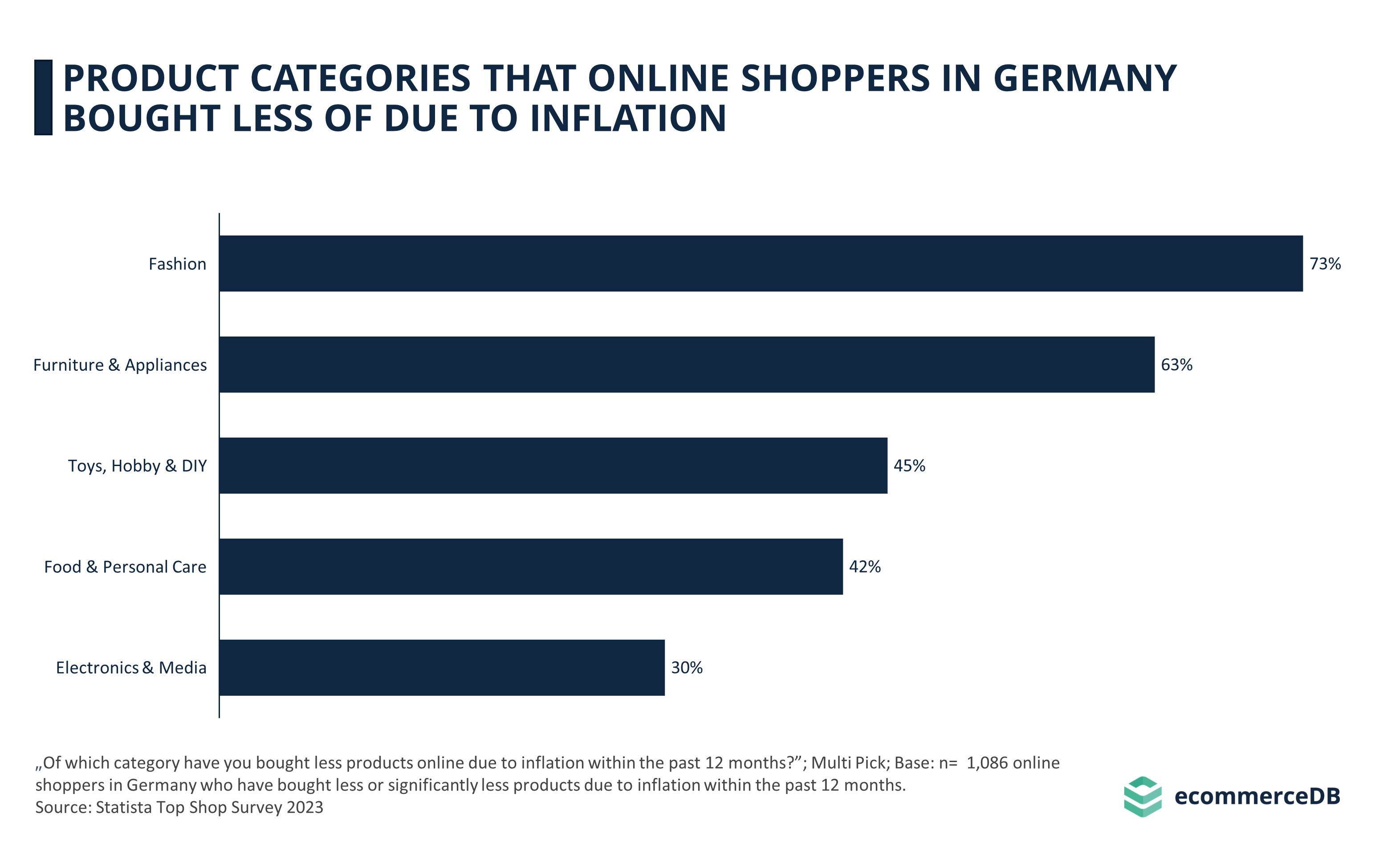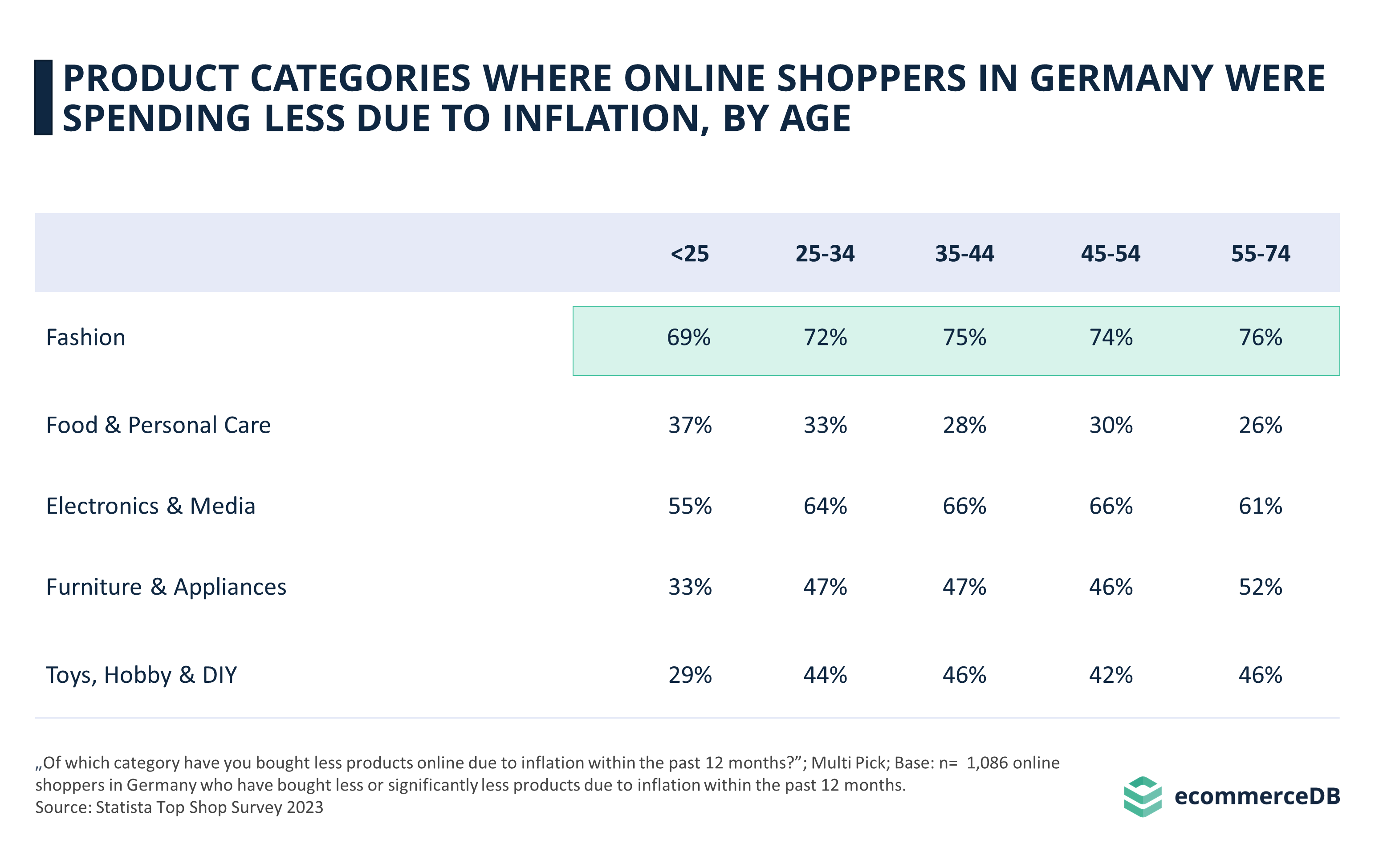Which Product Categories Online Shoppers in Germany Are Cutting Back on Due to Inflation
May 26, 2023
Download
Coming soon
Share

Inflation measures how much more expensive a set of goods and services has become over a given period of time. As the pandemic, the war in Ukraine, and supply shocks meeting rising consumer demand have contributed to increased prices at an inflation rate of 7.2% in Germany in April 2023, it is worth examining what measures consumers have taken to cope with the circumstances.
Considering those online shoppers in Germany who stated that they have bought fewer products online in the past year due to inflation, the following analysis shows in which product categories consumers are most likely to cut back on spending.
When Consumers Buy Fewer Products Due to Inflation, They Tend to Cut Back on Fashion Purchases
As shown in previous analyses, most online shoppers in Germany have not changed the number of products they buy online due to inflation. However, 28% of respondents to the Statista Top Shop survey said they bought fewer (17%) or significantly fewer (11%) products due to inflation.
Among those who buy less, online shoppers are statistically more likely to be between the ages of 35 and 64, in households with fewer than 3 members and with a net household income of less than €50,000.
Accordingly, Fashion is the product category where most (73%) shoppers who have bought less limited the number of products they bought on the internet.

Furniture & Appliances comes in second with 63% of respondents, and Toys, Hobby & DIY ranks third at 45%, followed by Food & Personal Care (42%). Electronics & Media purchases were reduced by less than a third (30%) of respondents.
Fashion includes clothing, footwear, bags, and accessories. As Clothing and Shoes are key categories for online shopping in Germany, the fact that most shoppers are cutting back on Fashion purchases due to inflation is not entirely surprising. However, Furniture & Appliances plays a smaller role in German eCommerce, so it is rather unexpected that many online shoppers in Germany are cutting back on purchases in this category.
Consumer Electronics, on the other hand, is a high-demand product category among online shoppers in Germany that has seen a relatively small reduction, underscoring the importance of this product group to consumers and their willingness to spend more on these items.
Age Distribution of Product Categories That Consumers in Germany Bought Less of Due to Inflation
Across all age groups, Fashion is the product category in which online shoppers in Germany tend to save the most, and this tendency increases with age. 69% of consumers under 25 said they have bought less Fashion due to inflation, compared to 76% of users aged 55 to 74.

This pattern is repeated across most of the categories listed, with younger consumers least likely to cut back on Electronics & Media, Furniture & Appliances, and Toys, Hobby & DIY. The only category in which online shoppers under 25 are most likely to cut back is Food & Personal Care at 37%. Consumers aged 55 to 74 are the least prone to limit the number of products they buy in this category (26%).
The correlation between age and product category restraint has the greatest statistical significance in Food & Personal Care, Furniture & Appliances, and Toys, Hobby & DIY with p-values below 0.05, as shown in the regression analysis. Age has the best explanatory power in Furniture & Appliances and Toys, Hobby & DIY with an R² of 1.5% and 1.1% respectively. The other values don’t explain more than 0.6% of the dependent variable’s variance.
This means that age has an impact on how consumers decide to limit their purchases in these categories, but one that is very weak. That is why other factors should be examined to get a more complete picture.
Younger Consumers Least Likely to Restrict Their Purchases in All Categories Except Food & Personal Care
Of the consumers surveyed in Statista’s 2023 study who have cut back on the number of products they buy online due to inflation, Fashion is the category in which most cutbacks were reported. This can be attributed to the fact that Fashion is a popular product category for online shopping in the first place and it moreover does not belong to the essential products that consumers rely on to ensure survival.
Age is a reliable predictor of product category restriction in the categories Food & Personal Care, Furniture & Appliances, and Toys, Hobby & DIY. Younger consumers are more likely to reduce their consumption of Food & Personal Care products, and are less likely to do so in all other categories.
Sources
Related insights
Article
Online Car Selling & Buying: Revenues, Forecast, Top Marketplaces & Trends
Online Car Selling & Buying: Revenues, Forecast, Top Marketplaces & Trends
Article
Fashion ReCommerce in the UK: Top Categories, Generational Attitudes, Leading Shops
Fashion ReCommerce in the UK: Top Categories, Generational Attitudes, Leading Shops
Article
Zalando, Otto & About You: Revenue, Market Growth, Business Strategies
Zalando, Otto & About You: Revenue, Market Growth, Business Strategies
Article
Online Shopping vs. In-Store Shopping in Europe: eCommerce Recovers After Post-Pandemic Dip
Online Shopping vs. In-Store Shopping in Europe: eCommerce Recovers After Post-Pandemic Dip
Article
eCommerce in Indonesia: Market to Reach US$100 Billion Soon
eCommerce in Indonesia: Market to Reach US$100 Billion Soon
Back to main topics